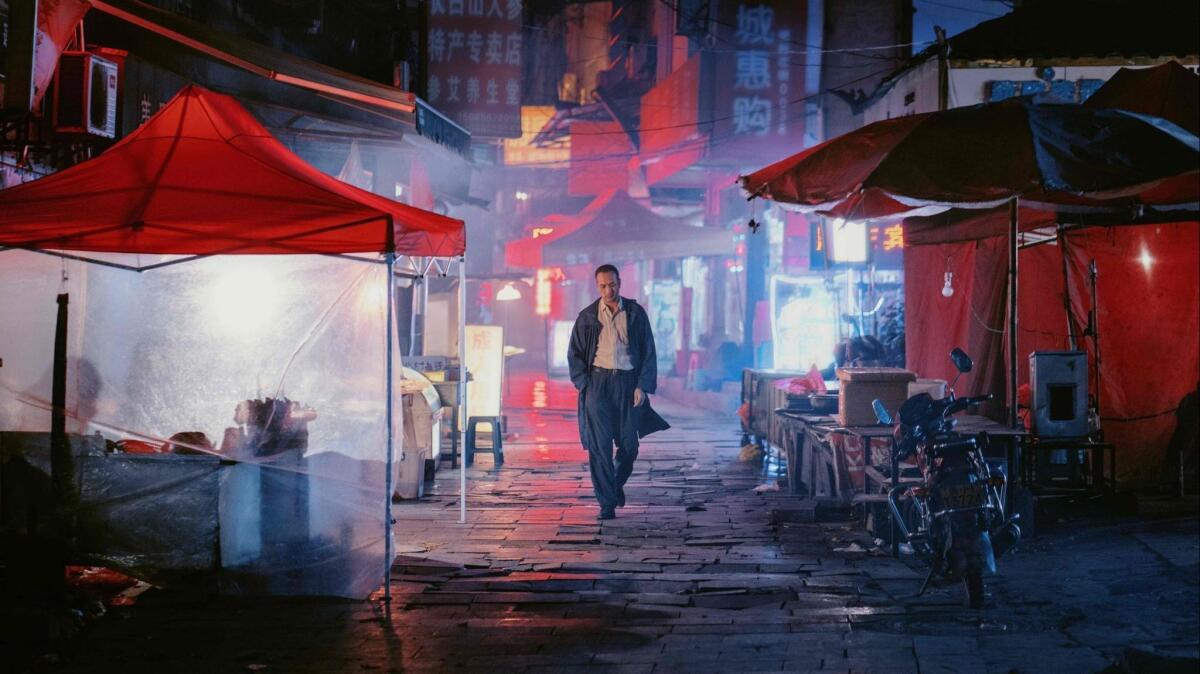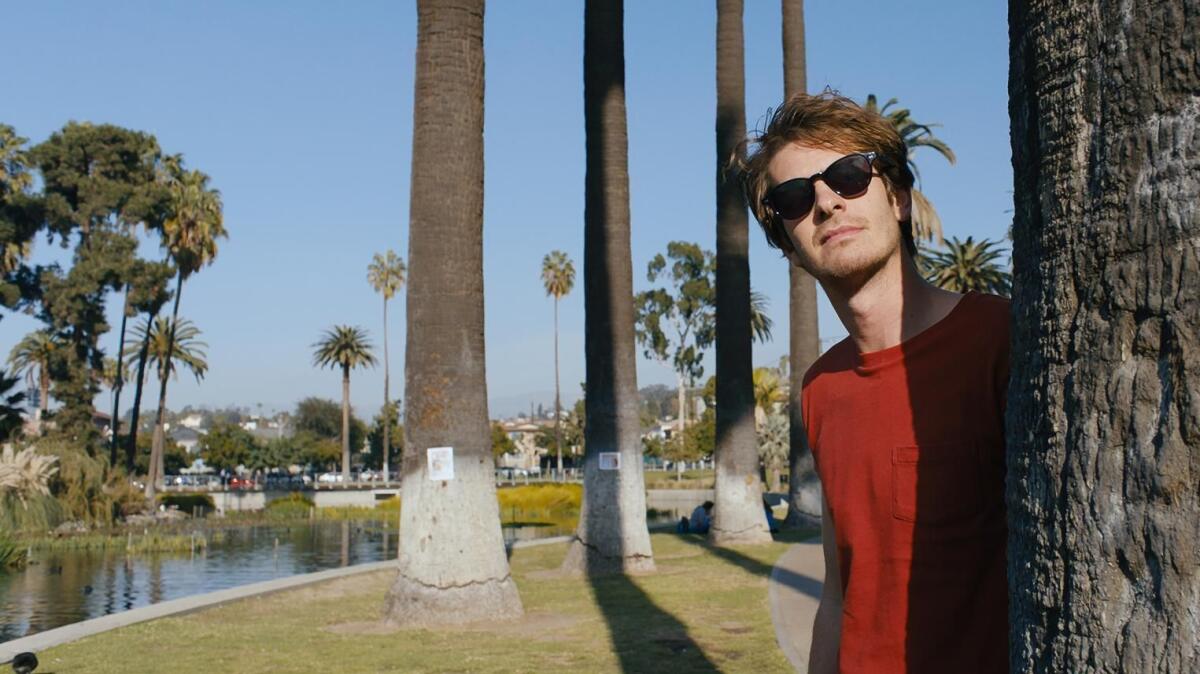Cannes delivers a triumph with Lee Chang-dongâs slow-âBurningâ masterwork
The 71st Cannes Film Festival is underway (May 8-19), and L.A. Times critic Justin Chang is there, seeing as many movies as possible and writing about it for a day-by-day, film-by-film diary. This is one in a series of entries spanning from the opening festivities to closing night. For more entries and reviews, click here.
Before the 71st Festival de Cannes had even begun, the word on the Croisette â that storied boulevard that winds its way along the beach through this small French Riviera town â was that we were in for the weakest lineup in recent memory. Abandoned by Netflix, devoid of Oscar bait and attended by just a handful of Hollywood stars, the grande dame of film festivals was clearly flailing with a slate of movies from a bunch of international filmmakers youâve never heard of and couldnât possibly be interested in getting acquainted with.
As a Los Angeles-based critic, I try to maintain an even temper about the persistent American Cinema First attitude â call it cultural incuriosity at best, outright xenophobia at worst â that poisons much of the so-called discourse around our movies.
Cutting-edge world cinema may be this festivalâs true raison dâĂŞtre, but it has always needed a delicate balance of blockbusters (like this yearâs âSolo: A Star Wars Storyâ) and English-language awards contenders in order to survive, thrive and attract media attention. In a film industry subject to enormous financial and technological change, that need may be stronger than ever.
Even still, declaring a festival lineup worthless is something best done after youâve seen a number of the films and found them wanting, not before. And with this yearâs Cannes now more than halfway over, I feel confident in saying that, far from being the worst, it strikes me as one of the stronger, more robustly surprising slates in recent memory, provided that filmmakers with names like Jafar Panahi, Hirokazu Kore-eda, Jia Zhangke and Bi Gan donât send you screaming from the theater.
In the main competition, which is but one of several strands in the festival, the Asian titles have been almost uniformly strong. That isnât always or even usually the case. Their representation has been spotty over the past decade, and itâs been eight years since a film by an Asian filmmaker, Apichatpong Weerasethakulâs âUncle Boonmee Who Can Recall His Past Lives,â won the Palme dâOr, the festivalâs top prize.
A number of viable Palme contenders have already emerged so far, among them Spike Leeâs blisteringly funny and topical entertainment âBlacKkKlansman,â Pawel Pawlikowskiâs exquisite doomed romance âCold Warâ and Alice Rohrwacherâs delicate humanist fable âHappy as Lazzaro.â
But to my mind, it was Lee Chang-dong who pretty much torched the competition Wednesday night with âBurning,â a quietly riveting stunner that marks this South Korean writer-directorâs first return to filmmaking, and to Cannes, since his prize-winning 2010 drama, âPoetry.â
Expertly adapted and elaborated from a 1992 Haruki Murakami short story, âBurningâ follows a shy, inarticulate young man named Jongsu (Yoo Ah-in) who divides his time between Seoul and his familyâs farm in a border town called Paju. Early on in the movie, Jongsu is reunited with a childhood friend, Haemi (Jeon Jong-seo), whom he quickly becomes smitten with, though she almost-but-not-quite tosses him aside for an independently rich boy named Ben (âThe Walking Deadâsâ Steven Yeun), whose every gesture of friendship and generosity toward Jongsu carries an unmistakable whiff of superiority. And also something more, something undefinably sinister.
At 2½ hours, âBurningâ is a character study that morphs, with masterly patience, subtlety and nary a single wasted minute, into a teasing mystery and eventually a full-blown thriller. To reveal more would ruin the storyâs slow-building pleasures, which are less about the haunting final destination than the subtle, razor-sharp microcurrents of class rage, family-inherited pain, everyday ennui and youthful despair that build in scene after scene, even when nothing more seems to be happening than a simple or not-so-simple conversation.
I first discovered Leeâs work at Cannes in 2007, when his wrenching drama âSecret Sunshineâ premiered in competition. Both that film and âPoetryâ confirmed him as a master of psychological portraiture, with an understanding of human fragility and an unsparing emotional ruthlessness that I have yet to encounter in the films of any other director working today.
âTo me, the world is a mystery,â Jongsu confesses in the movieâs most piercingly sad line. He could be speaking for any of the broken men and women who find themselves under Leeâs dramatic microscope, the fully formed creations of a filmmaker who offers no easy solutions, only the consolations of art.

Seductive âJourneyâ
A film as good as âBurningâ can make your festival. But in a sign of this yearâs embarrassment of riches, it was merely the second half of an extraordinary double bill that may constitute the best five hours of cinema Iâve ever devoured at Cannes in one fell swoop. The first half was âLong Dayâs Journey Into Nightâ (âDi Qiu Zui Hou De Yan Wanâ), the swooningly beautiful and technically staggering second feature from the prodigiously gifted 28-year-old Chinese director Bi Gan.
Bi turned heads a couple of years ago with his entrancing debut, âKaili Blues,â which featured, among other things, an unbroken 40-minute tracking shot. He outdoes that technical triumph and then some in âLong Dayâs Journey Into Night,â which has nothing to do with Eugene OâNeill. Itâs a melancholy, noirish dream of a movie played in the key of early Wong Kar-wai, built on the embers of a long-dissolved romance.
The first hour or so is a seductive memory piece unfolded in elusive yet tantalizing narrative fragments, but things really kick into gear in the second half, with a 55-minute tour de force of sustained mobile camerawork to rival such one-take wonders as âRussian Arkâ â and in 3-D, to boot. Itâs like a Max OphĂźls movie on crack, and the most magical piece of cinema Iâve seen in Cannes in many a year.

Ready Player Noir
âBurningâ wasnât the only roughly 2½-hour film in competition this week about a lonely young man investigating a womanâs disappearance and stumbling on more questions than answers. But while Leeâs movie doesnât waste one of its 150 minutes, âUnder the Silver Lake,â an L.A. noir pastiche from American writer-director David Robert Mitchell (âIt Followsâ), is an eccentric and amusingly self-indulgent affair, as sprawling as the city in which it unfolds.
Similarities in premise and theme are never rare in Cannes, a festival that consciously or unconsciously puts different films in conversation with each other. Thereâs also the fact that a lack of sleep and steady nourishment can heighten our awareness of these strange, subliminal connections. Or maybe theyâre just causing all the films to blur together so incomprehensibly that we start making up patterns and parallels that only we can see.
As it happens, the thrills of paranoid puzzle solving, of obsessively decoding riddles that might be entirely of our own devising, are central to âUnder the Silver Lake.â It follows (sorry) a slackerish dude (Andrew Garfield, playing well against type) whoâs facing eviction from his apartment but, rather than trying to scrounge up the money or get a job, immerses himself in a quasi-whodunit involving the disappearance of the neighborhood Hitchcock blonde (Riley Keough).
From there the plot bends and baffles in ways that I am neither obliged nor able to summarize. A billionaire has gone missing, and a dog killer is on the loose, but how these things connect â or whether they connect at all â is a matter the film seems content to postpone indefinitely.
When A24 releases the movie June 22, some may well set the plot entirely aside and devote themselves to tracking all the references that Mitchell has slyly embedded in the material: Itâs âMulholland Dr.â meets âThe Long Goodbyeâ meets âInherent Viceâ meets âThe Big Lebowski.â Itâs Ready Player Noir.
But if âUnder the Silver Lakeâ is overly taken with its own cinephilic cool, I found its self-indulgence surprisingly easy to roll with â and not just because itâs a hoot to fly six thousand miles to the South of France just so you can see places like Intelligentsia Coffee, Echo Park Lake and Griffith Park Observatory on the big screen.
Itâs the way Mitchell frames those and other L.A. locations, in expansive, underpopulated widescreen images that have an alienating dreaminess. As Garfieldâs character traces and retraces his footsteps, digging a little deeper each time, you may not care about what he finds, but youâre all too happy to get lost along the way.
Only good movies
Get the Indie Focus newsletter, Mark Olsen's weekly guide to the world of cinema.
You may occasionally receive promotional content from the Los Angeles Times.








